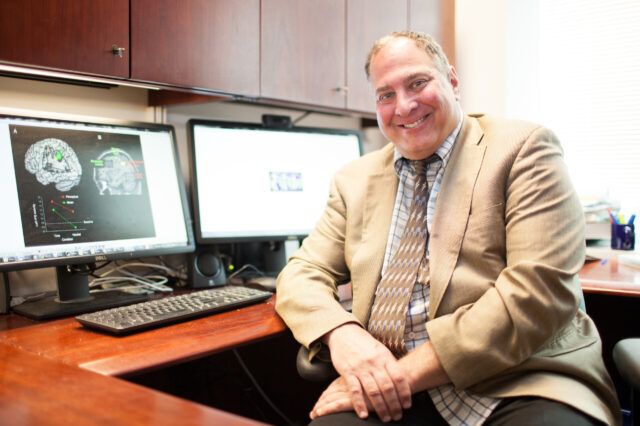UF researcher named the inaugural Evelyn F. McKnight chair in the Institute on Aging

The Evelyn F. and William L. McKnight Brain Institute of the University of Florida and the UF Institute on Aging are pleased to announce the formation of a newly endowed chair, the Evelyn F. McKnight chair for clinical translational research in cognitive aging and memory.
Ronald Cohen, Ph.D., director of the Cognitive Aging and Memory Clinical Translational Research Program or CAM-CTRP, and a professor of aging and geriatric research, neurology and psychiatry, has been named the inaugural endowed chair. Cohen’s chair is funded by an endowment from the McKnight Brain Research Foundation.
The mission of the CAM-CTRP is to advance understanding of normal cognitive aging, including brain changes that occur with advanced age. The CAM-CTRP aims to discover, develop and implement new neuroimaging, biological and behavioral approaches for assessing cognitive and brain aging, and interventions to slow, avert or restore age-related cognitive decline and memory loss. These interventions include cognitive and behavioral training approaches, brain stimulation methods to enhance neuroplasticity, and new drugs for neuroprotection and cognitive enhancement.
CAM-CTRP is affiliated with the Age-Related Memory Loss Program, or ARML, of the McKnight Brain Institute, or MBI. Thomas C. Foster, Ph.D., a professor in the department of neuroscience, is the director of ARML and holds the Evelyn F. McKnight chair for research on cognitive aging and memory. This program focuses on the neuroscience of brain aging and memory decline aimed at discoveries that can be translated to new clinical assessment and intervention approaches for cognitive aging.
“An important aspect will be to take this research from lab to bedside,” said J. Lee Dockery, M.D., a trustee for the McKnight Brain Research Foundation. “With the establishment of the chair for clinical translational research in cognitive aging, we complete the circle, and they complement each other.”
This will help researchers better understand what happens in the brain in the context of normal cognitive aging.
“Some cognitive functions tend to change with age, such as information processing speed, working memory and certain aspects of executive control,” Cohen said. “The neural bases for these changes are not well-understood.” Cohen’s research focuses on discovering ways of delaying or ameliorating normal cognitive aging — cognitive decline not caused by disease.
“This is the kind of memory decline that makes us ask, ‘Where did I put my car keys?’ and ‘Why am I staring into the refrigerator?’” Dockery said. “It’s those kinds of life-functioning cognitive issues that the McKnight Brain Research Foundation is so interested in.”
The chair will also strengthen the connection between the MBI and the IOA.
“UF Health has been and will be focused on advancing care for our patients as well as the research that informs this care,” said Thomas A. Pearson, M.D., M.P.H., Ph.D., executive vice president for research and education for UF Health. “Never are those two goals stronger than when we have researchers such as Dr. Cohen and Dr. Foster working across disciplines to put that research into practice.”
The formation of this chair formalizes the ties that already exist between the two institutions, according to Tetsuo Ashizawa, M.D, executive director of the MBI.
“There is a tight collaboration between the MBI and the IOA. Dr. Cohen has been enormously successful in terms of publishing, obtaining grants and collaborating with the MBI’s program in age-related memory loss, headed by Dr. Tom Foster,” Ashizawa said.
The collaboration includes working with the MBI program to take the group’s pharmaceutical developments in animal studies to clinical trial in humans.
“Our focus on the health and well-being of older adults intrinsically includes the healthy cognitive aging of this population,” said Marco Pahor, M.D., director of the UF IOA. “The support of the McKnight Brain Research Foundation will help us translate the critical science happening at the McKnight Brain Institute into techniques that may someday help patients we see every day.”
The endowment for Dr. Cohen’s chair will support the primary mission of the CAM-CTRP and provide the program with operational stability. This will enable other research and CAM-CTRP funds to be directed to studies that provide preliminary data that will catalyze subsequent larger research studies through National Institute on Aging, and other institutes of the NIH, along with extramural funding sources. It will also provide funds for the recruitment of new faculty and to help support current faculty.